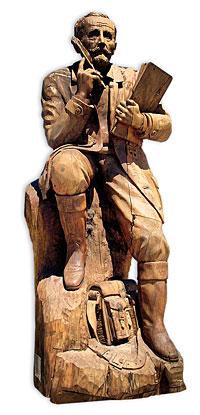 |
Everyone's a poet in Nepal, or so they say. It's no secret that poetry holds a special fascination for many Nepalis, thanks to such luminaries as Bhanubhakta, Laxmi Prasad Devkota and Bhupi Sherchan. And as the recent success of slam poetry in English indicates, this is not the preserve of the Nepali language either. If the corpus of prose that currently exists in Nepal is fairly limited and uneven, poetry appears to be in rude(r) health.
Why should this be so? Is the Nepali soul (let us imagine that there is such a thing) especially poetic? Is it that we have more to express in these times of transition? Is it that the overlap with the romantic sentiments of ghazals appeals to every thwarted lover (and there are many in Nepal)? And speaking of romantics, could it just be the superabundance of natural beauty to be found through the country that inspires us to speak in verse?
It's certainly not because poetry's easy. Last Sunday, several well-known intellectuals held forth on the difficulties of writing poetry at the launch of Buddhisagar Chapain's latest collection of verse.
Novelist Khagendra Sangraula conceded that he couldn't write poems, that it was something one couldn't force out like one might with prose. Columnist CK Lal delineated the composition of both prose and poetry. The first he termed an additive activity, placing brick upon brick of ideas joined together with the 'masala' of words. Poetry by contrast is a subtractive endeavour, he reminded us, a paring down akin to sculpture, till only the essential remains.
One can quibble with such definitions or limit the metaphor of construction to the process of writing a column such as this one. Yet it cannot be denied that poetry is less about moralistic platitudes or revolutionary rhetoric than allowing the reader to access the poet's distillations of experience.
So let us for the sake of argument accept that Nepalis have poetic souls. If we also hold that it involves both inspiration and the ability to focus on the essential, Nepalis should be adept at sorting out such problems as�well, electricity, water, fuel and that irksome matter of peace and the constitution. Oh but they are, you may say: in the absence of government, the Nepali people have managed admirably in doing it for themselves.
But is it perhaps that our national obsession with poetry has become a way not to focus on the essential, but to distract oneself from it? That in seeking to express our frustration with the clogging of our mental and physical spaces, we turn to pastoral imaginings of full moons rising over rice paddies? What, then, is the value of poetry, if we don't want it to furnish us with moral instruction or fire us with revolutionary fervour?
There are many reasons to believe we should all be poets, or respectful of them. Poetry is a way to keep our souls tender and minds receptive to the connections between the ugly and the beautiful, the good and the bad. It allows us to feel more keenly the specificity of the places we are in and the people we know, to thereby scrape away the globalising, dehumanising crust that threatens to envelop us all, while recognising the common ground we share. It helps us become better people in the broad sense of the word. Surely, this nation of poets will need such redeeming qualities in the days to come.



